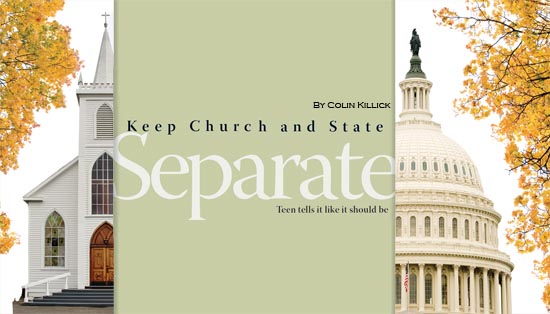Keep Church and State Separate
Colin Killick September/October 2008
"Congress shall make no law respecting an establishment of religion, or prohibiting the free exercise thereof."
Those 16 words from the First Amendment spark controversy today, as they have throughout American history.
Individuals have tried to inject religion into government and policy, to use religion as a political litmus test and to use the powers of government to pro-mote a religious belief, usually Christianity.
These people have argued that such interaction is constitutional, the separation of church and state is not cited in the U.S. Constitution, and the Founding Fathers intended the United States to be a Christian nation.
As such efforts intensify under the Religious Right, it is essential to reaffirm the barrier between religion and government.
First, it must be noted that support for the separation of church and state is in no way grounded in opposition to religion.
The belief that religious and government institutions should leave each other alone does not constitute an abandonment of faith. On the contrary, it is for many an expression of the principles of tolerance and respect common to all religions.
Furthermore, there is compelling reason for religious people to support separation: it not only protects government from undue religious influence, but also protects religion from undue governmental meddling.
This was the position of many early backers, who had feared the control that the government of England exerted over religious institutions and believers.
Without a firm separation of the two, the government could conceivably interfere with religious affairs and tell believers and institutions how to practice.
Anyone who would support a government based on his religious principles should carefully consider how government power functions. It is based, fundamentally, on precedent.
Once it is established that the government has the right to establish religious law, a sufficient majority of legislators could pass laws based on any system of religious belief.
Almost any law could be justified on religious grounds, particularly if such a government had the authority to compel its citizens to obey religious law.
Laws that establish religion in government, even if created with most benign intent, could put our nation on a path toward repressive theocracy.
Finally, the notion that the Founding Fathers intended our nation to be a Christian one is fundamentally wrong.
Our founders included a number of deists and skeptics of organized religion.
James Madison, though a religious man, spoke strongly and repeatedly for a strong separation of church and state.
Thomas Jefferson, who described himself as a Christian, removed every passage asserting the divinity of Jesus from his Bible, and spoke of the need for a wall between church and state.
The framers of the Constitution inserted a ban on religious tests for office, a common practice in most Western nations.
Considering that the laws of most such nations, particularly England, contained explicit establishments of Christianity, it would seem odd that founders intending to make America Christian would omit such language from the Constitution.
Rather, a clear clue to the intentions of the Founding Fathers can be found in an obscure but important diplomatic document: the Treaty of Tripoli, negotiated between the new United States and the Muslim Barbary state and ratified in 1797.
Buried in the standard diplomatic clauses is Article 11: "As the Government of the United States of America is not, in any sense, founded on the Christian religion . . . it is declared by the parties, that no pretext arising from religious opinions, shall ever produce an interruption of the harmony existing between the two countries."
The entire treaty, including Article 11, was read in full in Congress and printed in several major newspapers. No record of any disagreement or protest has ever been found.
Today, we must be vigilant in deter-ring any erosion of this crucial barrier. While religion naturally informs the ethical beliefs of our legislators, religious doctrine must never be established as law.
If we fail to guard this distinction, we risk destroying two of America's greatest institutions: the freedom of religious practice, and the right of citizens of all beliefs to fair and equal governance.
Colin Killick is a teen columnist for the Tucson Citizen. he wrote this for the february 19, 2008, edition. He is a senior at basis Tucson high school, Tucson, Arizona.